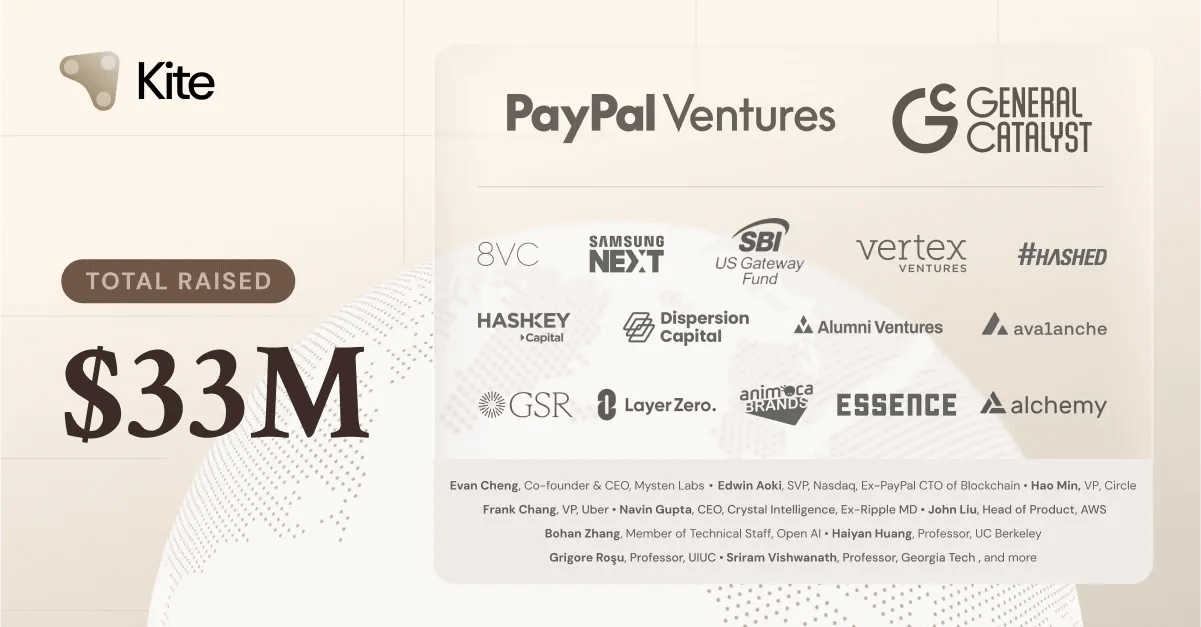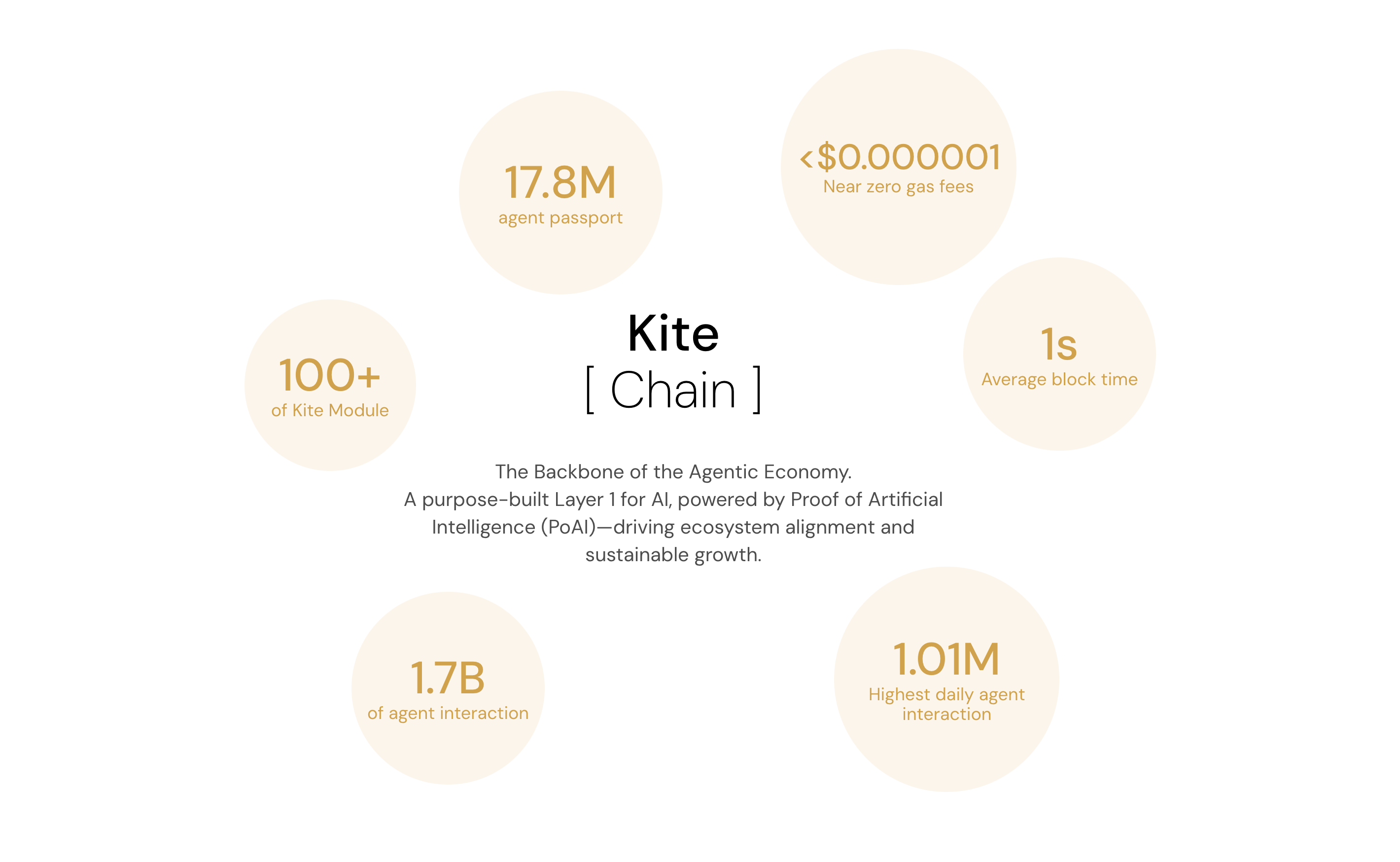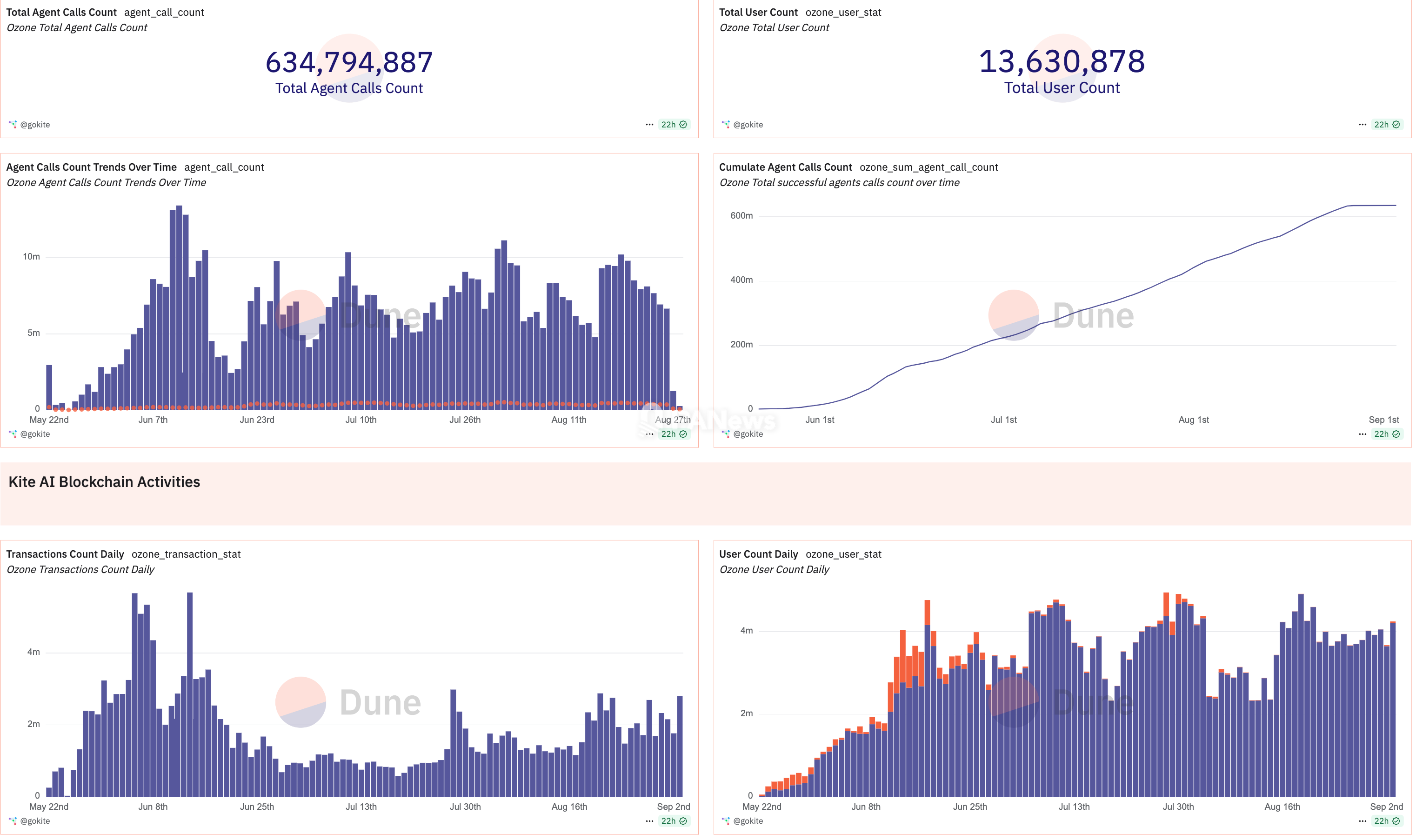
Author: Zen, PANews
With the rapid development of artificial intelligence, shopping and payment methods are being reshaped.
In April this year, Visa launched Visa Intelligent Commerce, leveraging AI to connect the "search to purchase" scenario, and collaborated with industry leaders such as Anthropic, Microsoft, Mistral AI, and Stripe, aiming to achieve personalized and secure AI commerce globally.
Last month, Google announced a new type of AI agent for basic service tasks—designed to cover restaurant reservations and gradually expand to local service appointments and event ticketing.
Today, traditional giants are competing to lay out their strategies, vying for the opportunity to establish AI agents as the next generation of mainstream user interfaces, with their reach extending into the blockchain and cryptocurrency fields. Earlier this month, Kite announced the completion of $18 million in financing, bringing its total funding to $33 million. The project aims to build a trust transaction layer for the agent economy, enabling agents to conduct transactions, coordinate, and operate independently. The platform is designed to provide autonomous agents with native access to crypto identity, programmable permissions, and stablecoin payments.
Unlike most Web3 projects, Kite's investors include several heavyweight institutions from traditional industries—led by PayPal Ventures and General Catalyst, with participation from Samsung, 8VC, and SBI, among others. So why did so many top institutions choose Kite?
Building a Native Economic Infrastructure for AI Agents
Currently, most autonomous agents are still deployed on centralized platforms, which are designed and optimized around human operations. While they excel in user convenience, they force agents to rely on sometimes fragile identity verification, authorization, and settlement processes, leading to efficiency bottlenecks and systemic risks.
In theory, existing blockchain infrastructure has clear advantages over traditional payment methods, including immutable logs, cryptographic proofs, and replicable smart contract logic. Additionally, blockchain-based payments can eliminate intermediaries and enable cross-border micropayments.
However, traditional blockchains and Web2 are also human user-centric, lacking native identity and trust mechanisms for autonomous agents. In traditional infrastructure, AI agents often "borrow" the identity of human users to operate, resulting in fragmented identities and security risks (M×N verification maze). Furthermore, mainstream public chains process transactions in discrete rhythms based on blocks, which is not suitable for continuous agent interactions, and in low-value transactions, fees can be prohibitively high, all of which are detrimental to high-frequency, low-value microtransactions for AI agents.
This is why Kite created a dedicated L1 blockchain network, envisioning AI agents as a new user category within the Web3 ecosystem, aimed at supporting autonomous agents with programmable trust and AI-compatible capabilities, integrating identity, payment, and behavior verification into a unified and composable protocol layer. By building a complete set of native economic infrastructure for intelligent agents, Kite enables agent commerce to operate at scale and securely.
The Kite team believes that the way people interact with the digital world will shift from direct human operation to autonomous AI agents acting on behalf of individuals. These agents will search for information, compare prices, place orders, sign contracts, manage subscriptions, and become the "new user interface." To achieve this, it is first necessary to structure and verify data, and the next step is to tailor native identity, trust, and programmable payment mechanisms for these agents.
Transforming from an Analytics Platform, $33 Million Financing to Build an AI "Dream Team"
In fact, Kite did not initially position itself as the infrastructure for autonomous agents. Kite's predecessor was Zettablock, which positioned itself as an "institutional-grade" Web3 indexing and analytics platform, providing large-scale real-time data support for multiple networks such as Sui, Polygon, Chainlink, and EigenLayer.
The rapid development of AI, along with the founding team members' experience and industry background in both blockchain and AI, led them to see the opportunity to pivot to the Web3 AI track.
Kite's co-founder and CEO Chi Zhang holds a PhD in Machine Learning/AI (Statistics) and a Master's degree in Economics from the University of California, Berkeley. She previously led data engineering product development at Databricks and served as Chief AI Expert at dotData. Another co-founder, Scott Shi, also serves as Kite's CTO, having built real-time AI infrastructure at Uber and been an early engineer on the Salesforce Einstein AI team.

Left: Scott Shi, Right: Chi Zhang
The two core members collectively hold dozens of patents and top conference papers related to AI and blockchain. Most of the other team members also come from companies like Uber, Databricks, Salesforce, and NEAR, with backgrounds from prestigious institutions such as Stanford, MIT, and the University of Tokyo, and are experienced in blockchain protocol engineering and big data systems.
Earlier this month, Kite announced the completion of $18 million in Series A financing, led by PayPal Ventures and General Catalyst, with other investors including 8VC, Samsung Next, SBI US Gateway Fund, Temasek's Vertex Ventures, Hashed, HashKey, Avalanche Foundation, LayerZero, and Animoca Brands. Following this round of financing, Kite's total funding reached $33 million. The funds will be used to expand the agent trading platform and enhance the capability of AI agents to conduct large-scale micropayments on-chain using stablecoins.

PayPal Ventures described Kite as "the first infrastructure tailored for the agent economy," pointing out that stablecoins and millisecond-level settlement are key technical gaps in AI agent systems, and Kite has built an important bridge in this regard. Additionally, Kite is collaborating with platforms like PayPal and Shopify, currently in pilot phases, allowing merchants to access the agent system through Kite's Agent App Store.
Modular Architecture and Kite AIR
Kite's technical architecture is highly modular, primarily focused on meeting the needs of AI agents. Its foundational layer is an EVM-compatible Layer-1 chain, with the current performance metrics displayed on Kite's official website being "1 second average block time, nearly zero fees."

The underlying operating environment of the network is a customized KiteVM, employing a new consensus mechanism called "Proof of Attributed Intelligence" (PoAI). PoAI consensus combines proof of stake (PoS) with attribution mechanisms, allowing for transparent attribution and rewards for the models and data contributions executing tasks while nodes validate blocks. This means that every agent task, including model invocation, data provision, and transaction completion, can leave an auditable record on-chain, ensuring that all parties can fairly receive rewards.
As an infrastructure designed specifically for large-scale, high-frequency AI agents, Kite's architecture prioritizes speed and scalability. Its technical foundation is the state channel mechanism: this mechanism supports off-chain streaming micropayments and communication between agents, enabling near-instant final confirmations. Frequently trading agents can open secure channels, allowing for point-to-point, real-time completion of small payments or data exchanges without waiting for block confirmations. Billions of micro-events can be processed off-chain and periodically settled on the main chain, significantly enhancing throughput and reducing costs. Based on this, Kite can support streaming micropayments billed by API calls, computation duration, or data bytes, meeting the high-frequency billing needs of the agent economy.
Additionally, the Kite team has launched a series of tools and modules for developers and agents. The Kite AIR (Agent Identity Resolution) system introduced on its platform aims to provide agents with secure identity recognition, policy execution, a verifiable record system, and programmable payments executed on Kite's AI-native customized blockchain. Core components of Kite AIR include KitePass (agent passport) for verifiable identity and policy execution, the Kite Agent App Store for market and service discovery, and integration tools like Kite SDK & MCP server for agents.
Among these, KitePass is the identity module designed for agents: each agent, dataset, or AI model can have a unique cryptographic identity identifier, bound to corresponding permissions and reputation information. Through this identity system, agents can use different services without repeated registration, while their operational history and permission scope can be tracked on-chain. The programmable governance features based on identity allow agents to have fine-grained automated permission control, such as setting restrictions on task types and fund usage, ensuring that agents comply with predetermined rules during operation.
The Kite Agent App Store is a unified marketplace and service discovery engine for service providers and autonomous agents: service providers can list their offerings and monetize APIs, AI models, data services, or business logic through automated payment processing, while gaining market access, identity-based trust, and usage analytics; for agents and developers, the App Store provides direct service discovery channels, automated settlement through Kite's settlement channels (with each transaction verifiable on-chain), complete usage record tracking, and a consumable process that interlinks identity, payment, and discovery.
Kite SDK and MCP Server are the toolchains for integrating applications into Kite's identity and settlement infrastructure: Kite SDK is aimed at agent developers, providing tools to build agents with verifiable identities, policy execution, and on-chain settlement capabilities, suitable for creating autonomous agents, agent-driven business applications, cross-platform agent processes, and prototype validation; MCP Server (Model Context Protocol Server) is aimed at existing AI applications, allowing any MCP-compatible application to utilize Kite's identity and settlement functions, thereby enabling existing chatbots or AI assistants to participate in agent commerce, opening the gateway to agent capabilities for non-technical users, and bridging traditional AI tools with machine-to-machine economies.
Aero Public Test to Ozone Upgrade, Hundreds of Millions of Calls, Tens of Millions of Users
In February 2025, Kite launched its first public test network v1, codenamed Aero, on the Avalanche network. This network aims to enhance scalability and data processing capabilities while providing centralized coordination for AI workflows (including data providers, model builders, and autonomous agents). By the end of March, the official statistics for testnet v1 Aero were released, claiming that since its launch, the network has processed over 546 million AI agent calls, averaging about 11.4 million per day, executed approximately 32 million transactions, and connected around 4 million users, of which about 2.4 million are independent AI agent users.

After the first phase of exploration, in late May this year, Kite AI upgraded the Aero testnet to Ozone, positioning it as the Agentic AI interaction portal. The product narrative began to shift from "scalable AI infrastructure" to "the foundational layer supporting the operation of the agent economy." The launch of Ozone further expanded the entire Kite AI ecosystem. According to Dune data, as of September 5, the network has processed over 634 million AI agent calls and connected approximately 13.6 million users. In terms of daily active accounts and new additions, it has maintained a high level since mid-August, with an average of 4 million daily active accounts.

In the official announcement of the Series A financing, Kite began to describe its mission as "building the foundational layer of the agent internet," stating that its foundational layer powers the entire agent ecosystem through three pillars:
- Providing cryptographic identities for AI models, agents, datasets, and any digital services. Each AI "participant" or "asset" can maintain a unique and verifiable identity to support traceability, provenance, and governance.
- Programmable and fine-grained governance over delegated permissions, usage restrictions, and spending behaviors—managing how AI agents operate autonomously in the "wild."
- Instant agent payments, with fees close to zero, enabling autonomous systems to discover, negotiate, and pay for services with native access to stablecoins.
Steve Everett, Head of Global Market Development for Cryptocurrency and Digital Assets at PayPal, commented on their product, stating that achieving synchronous atomic settlement through smart contracts and supporting real-time tracking and auditing across high-performance blockchain protocols is a killer combination for programmable payments in the AI agent commerce field. This opens the door to a truly global automated economy, where people, businesses, and machines can interact with mutual trust easily.
Overall, Kite's business model deepens with the development of the agent economy, facing challenges in ecosystem building and its own technological iteration, while its advantage lies in early market positioning. Whether it can stand out among numerous AI blockchain projects in the future will depend on its ability to truly solve the trust and settlement issues between agents, thereby providing a reliable foundation for automated economic activities.
免责声明:本文章仅代表作者个人观点,不代表本平台的立场和观点。本文章仅供信息分享,不构成对任何人的任何投资建议。用户与作者之间的任何争议,与本平台无关。如网页中刊载的文章或图片涉及侵权,请提供相关的权利证明和身份证明发送邮件到support@aicoin.com,本平台相关工作人员将会进行核查。




